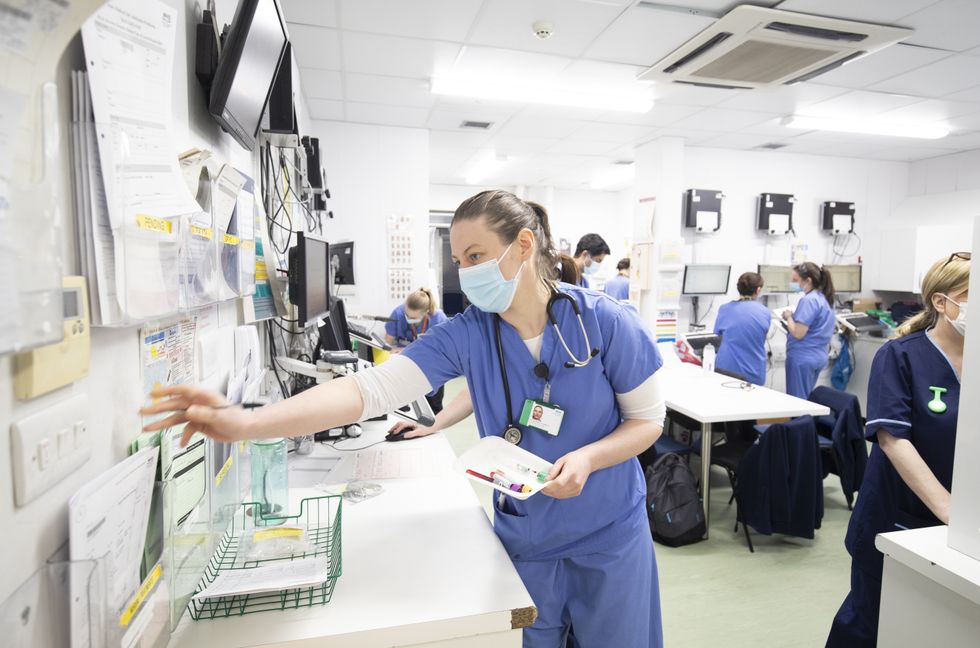NHS staff quitting in droves after Covid pandemic - blaming 'work-life balance'
Dedicated NHS staff who planned to quit but stayed on to help battle Covid are now leaving in their droves
Don't Miss
Most Read
Stressed NHS staff who bravely battled the pandemic are now quitting in droves blaming poor pay and work-life balance - suggesting the BBC hit drama This Is Going To Hurt is even more realistic than viewers first feared.
Dedicated workers who may have been planning to hand in their notice in 2020 stayed on to help efforts battling the virus but these and others are now leaving in droves, according to new statistics.
A whopping 171,276 NHS England staff have resigned from their roles since the start of the pandemic, according to analysis of the latest NHS workforce data by medical negligence experts Boyes Turner Claims.
The figures show how brave but beleaguered staff refused to quit during the battle with covid as fewer left in the first year of the pandemic – 14,083 less in 2020 compared to 2019 (-13% year-on-year).
Jane Barlow
However once covid went into retreat, the number of resignations has rocketed back up, with the second quarter of 2021 seeing a whopping 31% year-on-year increase in NHS leavers compared to the corresponding period in 2020.
Leavers blamed pandemic fatigue, disillusionment with roles, poor work-life balance and pay as the driving force behind handing their notices in.
Resignations citing a 'better reward package' more than doubled (+105%) year-on-year from 2020-21 to the period 2021-22.
In the same time frame, 'lack of opportunities' rose by 68% and 'work-life balance' was close behind rising by 57%.
'Incompatible working relationships' increased by 51% in workers' decisions to leave, followed by a 30% increase in those citing health issues.
A staggering 15,220 NHS England midwives also resigned from their roles since the start of the pandemic.
A key factor in staff across all staff roles leaving the service in the last year was a desire for a greater work-life balance, with one in 10 giving this as a reason for their resignation.
Analysis of data obtained from the NHS through an FOI shows that midwives are the most likely to mention a lack of work-life balance as a key factor in leaving the service.
Kirsty O'Connor
Almost one in five resignations (17%) in midwifery gave this as a reason for their departure from the service, followed by nurses (15%) and support to ambulance staff (13%).
Richard Money-Kyrle, Partner of the Medical Negligence team at Boyes Turner, said: "NHS staff have worked tirelessly throughout the Covid-19 pandemic - treating patients with the virus while also trying to maintain the level of care provided to everyone who requires NHS services.
"That fewer staff left the health service in 2020 compared to previous years shows the dedication of medical professionals across the country.
"But as the pandemic extends into its third year, we’re seeing staff leave in higher volumes than before the virus took hold.
“This is affecting the stability of the NHS workforce with experienced staff leaving.
"The increase in resignations citing issues around work-life balance, career opportunities, and salaries underscores the pressure and strain placed on NHS staff since covid first emerged."
For further information on the research, visit:
The NHS Great Resignation | Boyes Turner
ROLES MOST LIKELY TO BE AFFECTED BY POOR ‘WORK-LIFE BALANCE’
- Midwives (17%)
- Nurses (15%)
- Support to ambulance staff (13%)
- Scientific, therapeutic and technical staff (13%)
- Support to doctors, nurses and midwives (13%)













